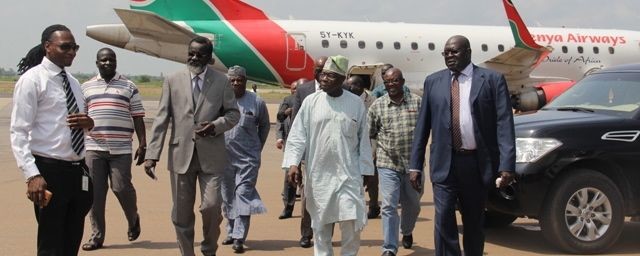The Africa Union Commission of inquiry headed by former Nigerian President Olusegun Obasanjo arrived in Juba on Sunday afternoon for a visit of five days to make consultations with ordinary South Sudanese citizens for more inputs for their investigation.
Speaking to the press at Juba Airport upon their arrival, Obasanjo said that the AU Commission of Inquiry mandate has been extended for three month in order for the commission to complete their investigation in the country.
The commission was formed after reports of mass killings in the capital Juba in December 2013.
Obesanjo stated, “We now want to meet people that we need to talk to. We want to meet the ordinary people in the ten states in the country because all South Sudanese as far as we are concerned are the stakeholders in peace and security of this country. The more people we meet, the better,” he said.
“We were given three months, and we were here before and have gone to the other parts of the country to see for ourselves what evidence we could see of what transpired,” Obasanjo said.
He was asked whether the recent clashes in parts of the country will jeopardize the investigation process, to which he replied, “We will not shy away from any place because of clashes because that is part of our commission mandate is to [address] healing, reconciliation, accountability and institutional reforms.”
“If we do not go round how do we know where bleeding is so that we can advise how to stop the bleeding and to get the process of healing started?” Obasanjo questioned. He noted that they will meet the president and a few days ago also met the former vice president, who is now a rebel leader.
The commission is tasked to produce a report within three months to be presented to the AU Peace and Security Council on crimes committed in the country since the month of December.
Photo: Deputy Foreign Minister Bashir Gbandi (center-left, in suit) welcomes former Nigerian President Olesegun Obasango (center-right, in white)
Related:
Law experts says S Sudan government has ‘no will, no capacity’ to investigate atrocities (15 July)




